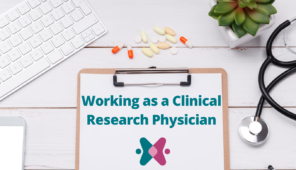A Closer Look at a Medico-legal Career for Doctors
We explore all the in and outs of a medico-legal career for doctors.

Medico-legal work is an attractive option for doctors either seeking to diversify their practice, take a career break or leave clinical medicine altogether. With the number of legal processes involving the NHS increasing every year, it is a rapidly evolving and exciting area to work in. We explore all the in and outs of a medico-legal career for doctors.
What does medico-legal work as a doctor involve?
This will depend on your specific role, but the work is generally varied and mixes urgent and non-urgent components. It can include:
- Defending clinical negligence claims.
- Reviewing and fact-checking statements for submission to solicitors or HM Coroner.
- Preparing clinicians to give evidence as witnesses in court, and attending with them on the day.
- Providing emergency advice to healthcare professionals dealing with immediate and challenging situations.
- Being involved in alternative dispute resolution, such as mediation.
- Acting as an independent expert witness for claimant or defence solicitor firms.
- Handling non-clinical claims, such as those involving staff members or visitors who have been injured on hospital grounds.
- Teaching healthcare professionals and disseminating learning from legal processes to help improve patient care.
Reasons why medico-legal work is a natural fit for doctors
Uses medical knowledge and experience
This helps alleviate the worry many doctors have that they will be “wasting” their degree and any time spent in the NHS if they reduce or give up their clinical work.
Good work-life balance
Working hours are generally less antisocial than shift work, often with the option of home-working.
Varied routine with some emergency issues
Urgent legal or ethical situations can arise quickly and require rapid advice and possible escalation (e.g. capacity & consent issues for lifesaving procedures such as blood transfusions). The range of ethical issues which are involved can be particularly interesting for those with a medical background.
Multi-disciplinary team working
Daily interactions with a different type of multi-disciplinary team (clinical witnesses, Coroner’s officers, Patient Safety staff, solicitors’ firms etc.)
Insight into NHS structure
This can be an interesting way to gain an overview of how the many parts of the NHS function and interconnect on a day-to-day level.
Teaching using lessons learned
Legal processes and outcomes can be used as effective learning tools for both clinical and non-clinical staff using anonymised patient data.
Career progression
Whether GMC registration is retained or not, there’s a wide range of opportunities open to doctors who undertake medico-legal work. This could include working as part of an NHS Trust, a specialist NHS body, a regulatory or safety and quality organisation, or within academia. Alternatively, there’s plenty of scope to be self-employed or to develop a portfolio career.
How do I know if medico-legal work will suit me specifically?
Like any job, it may take some time actually in the role before you’ll know if it’s definitely the right move for you. Here are some useful questions to consider in advance:
- Do you like working in an office environment? A large portion of medico-legal work is computer-based with a heavy focus on email communication, so if you’re someone who likes to be physically active during your day — consider whether this will work for you. The usual week will vary depending on your role and organisation, but office hours of Monday—Friday 9am—5pm aren’t unusual (with additional on-call requirements for some jobs).
- Are you a good communicator? In many medico-legal roles you may be seen as the bearer of bad news for healthcare professionals, and/or need to obtain specific details from the staff involved within tight deadlines. You’ll also be communicating with some individuals who do not have a clinical background — striking the right tone with every interaction is very important, and the ability to easily switch between technical and lay language is a must. You may also be speaking with patients and their families, particularly if you’re involved with external quality or regulatory investigations.
- Are you empathetic? Many doctors may end up feeling that the legal case in question is the lowest point of their professional career to date. It’s important to bear this in mind and respond appropriately to them at all times. Depending on your role, you may also need to arrange referrals to counselling services if any clinicians are reliving events related to particularly traumatic cases.
- Do you have a good eye for detail? According to our CVs, we all do! But be honest with yourself — do you naturally notice typos, spelling mistakes, and errors in sentence structure? Or does the idea of fact-checking a few thousand words for grammatical and factual accuracy send shivers up your spine? If it’s the latter, then medico-legal work may not be for you.
- Can you be impartial? Medico-legal work requires a fair investigation of the facts, and as a doctor you may find that a particular case resonates with your own experiences. You’ll need to be able to separate your medical knowledge from your personal opinions, particularly if you are employed in an impartial capacity with a duty to the court as an expert witness. The NHS works on the basis that if errors have been made, these should be openly discussed with patients and put right as far as is possible — any issues identified as part of a legal process are not exempt from this, and correct Duty of Candour requirements should be fulfilled at all times.
I enjoy my current job, as it allows me to use my medical knowledge whilst exploring and developing new skills in a non-clinical role
Excerpt from Medic Footprints Case Study: Dr Fiona Dogan
Read the full article right here.
How to start a career in medico-legal as a doctor
Firstly, be realistic about the roles suitable for you based on your clinical experience. Some jobs don’t require a medical degree while others ask for a minimum of 10 years’ specialty exposure, and the salary and workload varies accordingly. As a general (and by no means exhaustive) guide:
Foundation/SHO level — a good place to start if you have less than 5 years’ clinical experience is to look for jobs within your local NHS Trust’s medico-legal team, for example as an inquests & claims handler. This doesn’t require a medical degree so it’s an option for any grade of doctor; however, this also means that if you wish to keep your GMC registration it is your own responsibility to organise. The salary tends to be roughly the same as you would expect at the start of Core or Specialty Year 1 Training, and you can continue to pay into your existing NHS Pension should you wish to transfer it. Open vacancies are usually listed on the NHS Jobs website, but if the correct candidate isn’t found the vacancy doesn’t necessarily reappear online. So, if there are no jobs currently being advertised — be bold and contact the department manager via the hospital’s switchboard. Explain your interest, ask if you can email them a CV, and consider requesting an informal meeting to get a feel for the role.
SpR/Consultant/GP level — if you have 5 years’ post-qualification experience then you could consider working as a Medico-legal Adviser (MLA) with one of the defence organisations, such as MPS, MDU, or MDDUS. This can be on a full-time or part-time basis alongside any clinical commitments, and as GMC registration is required for this role the organisation should help to arrange your appraisals and revalidation. In order to be considered you will usually need either a post-graduate legal qualification or some experience within the medico-legal field. There can be various perks included with these companies such as private health insurance, pension schemes and gym memberships, and part-time working is also an option.
Senior Consultant/Senior GP level — if you have 10+ years’ clinical experience the role of expert witness may be an attractive option for you. This involves analysing all of the medical information related to a clinical negligence claim, and stating whether the care provided was appropriate in the circumstances. You then produce a comprehensive report for use by the solicitors who have hired you, and you may be required to attend court as a witness should the case head to trial. This role is largely self-driven and reliant on your reputation, and as your duty is to the Court it requires complete honesty and factual assessment regardless of your employer. You’ll need to be able to establish good relationships with solicitors, build up your own caseload, attend teaching and courses relevant to your duties, and ensure you have the correct indemnity for all aspects of your work.
International options — in many other countries, including Australia and the USA, you can pursue a career as an expert witness or medical defence organisation adviser following a similar process to that seen in the UK. However, as different states and territories in other countries can have different healthcare organisations and legal processes, your job search will need to be targeted to the location you wish to work in. Contacting organisations such as the Australasian College of Legal Medicine or the American Medical Association Litigation Center are a great way to get started.

Boost your career chances with these medico-legal CV extras:
- Undertake a distance learning Master’s degree, Bachelor’s degree, Diploma or Postgraduate Certificate in a subject like Medical Law & Ethics.
- Apply for a course with a defence medical malpractice firm, such as the Capsticks Diploma in Clinical Risk and Claims Management (one day per month for 6 months).
- Undertake audits and get involved with Patient Safety and Risk Management teams at your place of work — learning from claims and inquests is largely based around protecting patients and minimising future clinical risks.
- Join or set up an Ethics Committee at your Trust or surgery.
- Present and teach your colleagues to show your enthusiasm for disseminating useful information, especially at M&M meetings and on Clinical Governance days.
- Keep up to date with developments via the Faculty of Forensic and Legal Medicine (FFLM).
- Consider a conversion course such as a Graduate Diploma in Law (GDL).
As a doctor, can I really work in the medico-legal field without a law degree?
Absolutely. Whether you’re taking a break from clinical practice early on in your career or you need a new challenge after many years in your consultant post, you’ve gained a wealth of transferable skills which will serve you well in this field. The ability of doctors to learn quickly, work in constantly changing teams, and deal effectively with extremely stressful urgent situations is often seen as commonplace in medicine — in reality, these are sought-after skills which contribute to a high level of professional resilience. In the medico-legal field, your clinical knowledge will be invaluable whether you are providing an expert report or interpreting large amounts of complicated medical information, and you should NEVER underestimate how useful your translation skills will be when it comes to deciphering handwritten documentation! You’re likely to exhibit true empathy when dealing with advice calls or managing witnesses and families, due to your knowledge of the real pressures and issues within the healthcare system. Finally, the outcomes of legal processes can genuinely affect positive change within Trusts and the NHS as a whole, which in turn improves patient care and provides a high level of job satisfaction for many of those involved.
For more on a medico-legal career as a doctor, check out our LIVE webinar “Medico-Legal Careers for Doctors: Key strategies for you” with 3 experts in the field.
Fiona Dogan
Latest posts by Fiona Dogan (see all)
- Discover Management Consultancy as a Career for Doctors - 4th September 2024
- A Closer Look at a Medico-legal Career for Doctors - 2nd September 2024
- All aboard the HealthSHIP! Medical students innovate to support the pandemic - 7th May 2020



